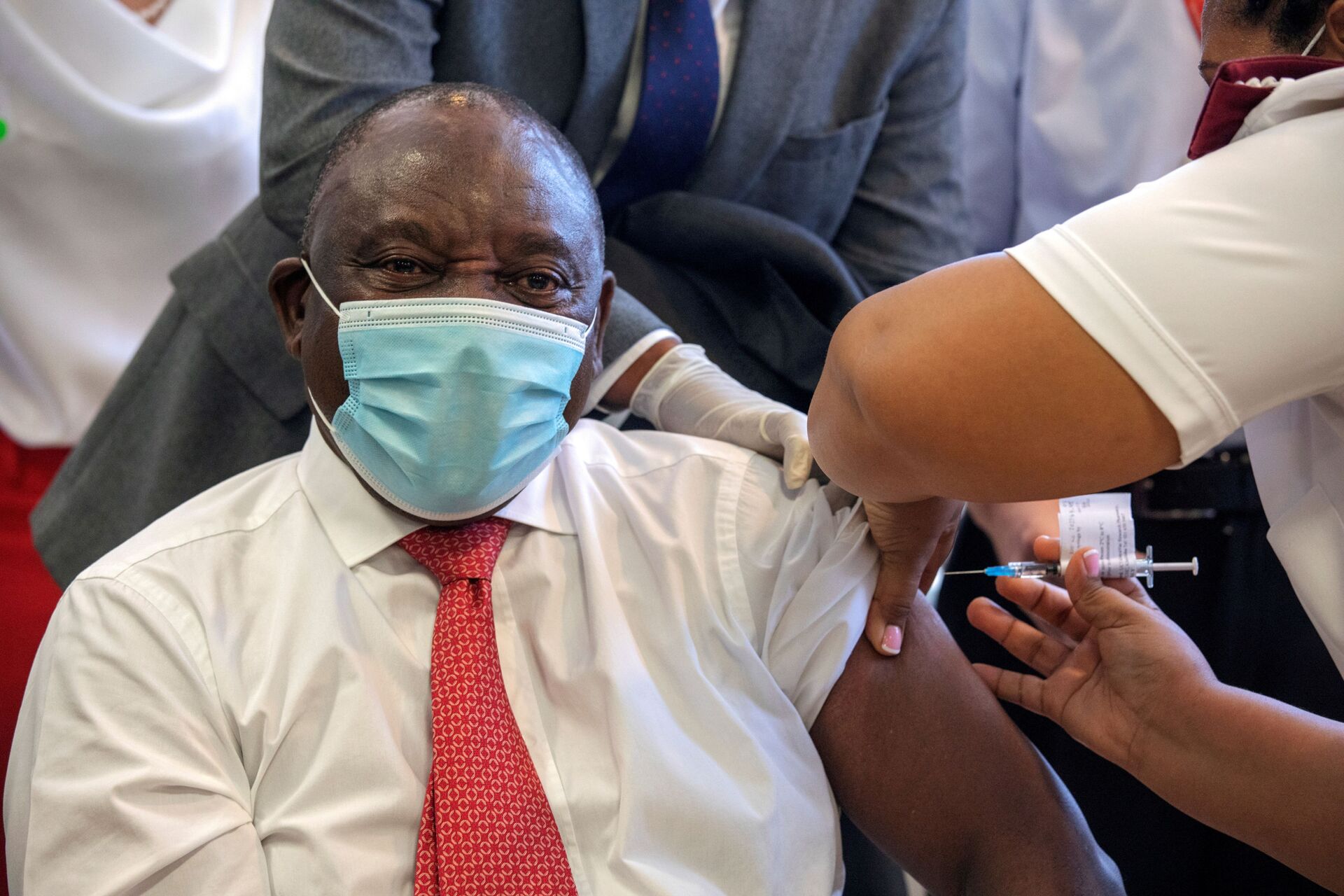Government Disunity, Slow Response to Economic Issues Fuel South Africa Unrest
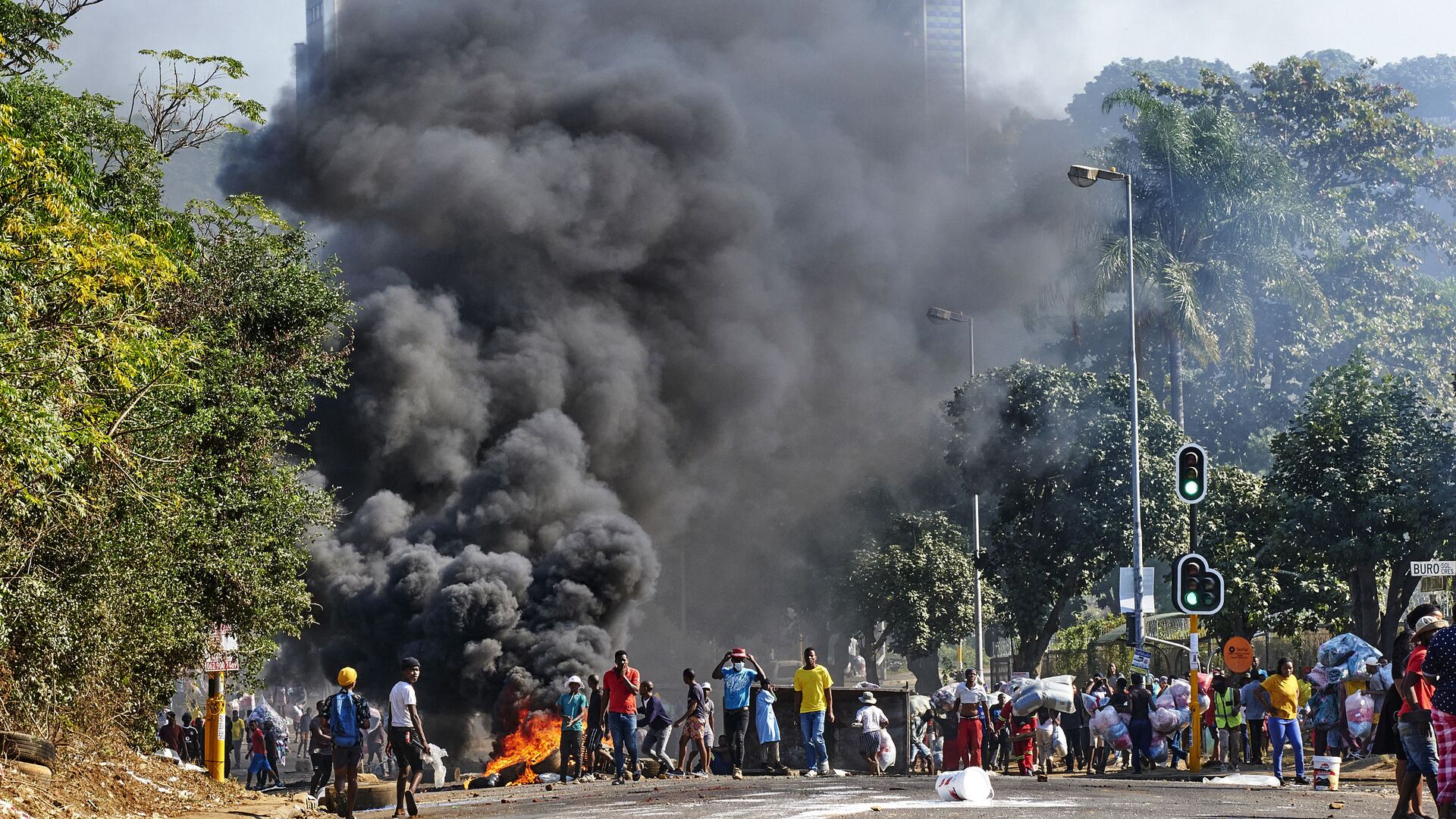
© AP Photo / Andre Swart
Subscribe
WASHINGTON (Sputnik) - The lack of unity and the failure to address economic problems facing South Africa are only adding to the unrest that has gripped the country following the incarceration of former President Jacob Zuma, analysts told Sputnik.
On 7 July, Zuma turned himself in to begin serving a fifteen-month sentence for contempt of court after skipping a corruption trial. The news sparked protests and unrest which began in Zuma's home province of Kwa Zulu-Natal and has since expanded to South Africa's economic capital of Johannesburg in Gauteng.
Protests, Criminality And Looting Sprees
The protests that erupted last week soon turned into riots complete with looting and acts of vandalism. An estimated 72 have died in clashes between police and protesters and rioters, according to local South African media reports, while 3,000 have been arrested.
Institute for Security Studies Senior Research Fellow for Conflict Prevention and Risk Analysis David Zounmenou told Sputnik that the current situation is a manifestation of deeper structural challenges facing South Africa.
"Among those challenges, one can find the factionalism within the ANC, the ruling party, persistent social and economic inequalities, soaring unemployment mainly among the young people," he said. "The incarceration of the former president... was a trigger that sparked the ongoing violence. Some would like to argue that protesters are asking for his release but criminal elements have also taken advantage of the state security weaknesses to wreak havoc".
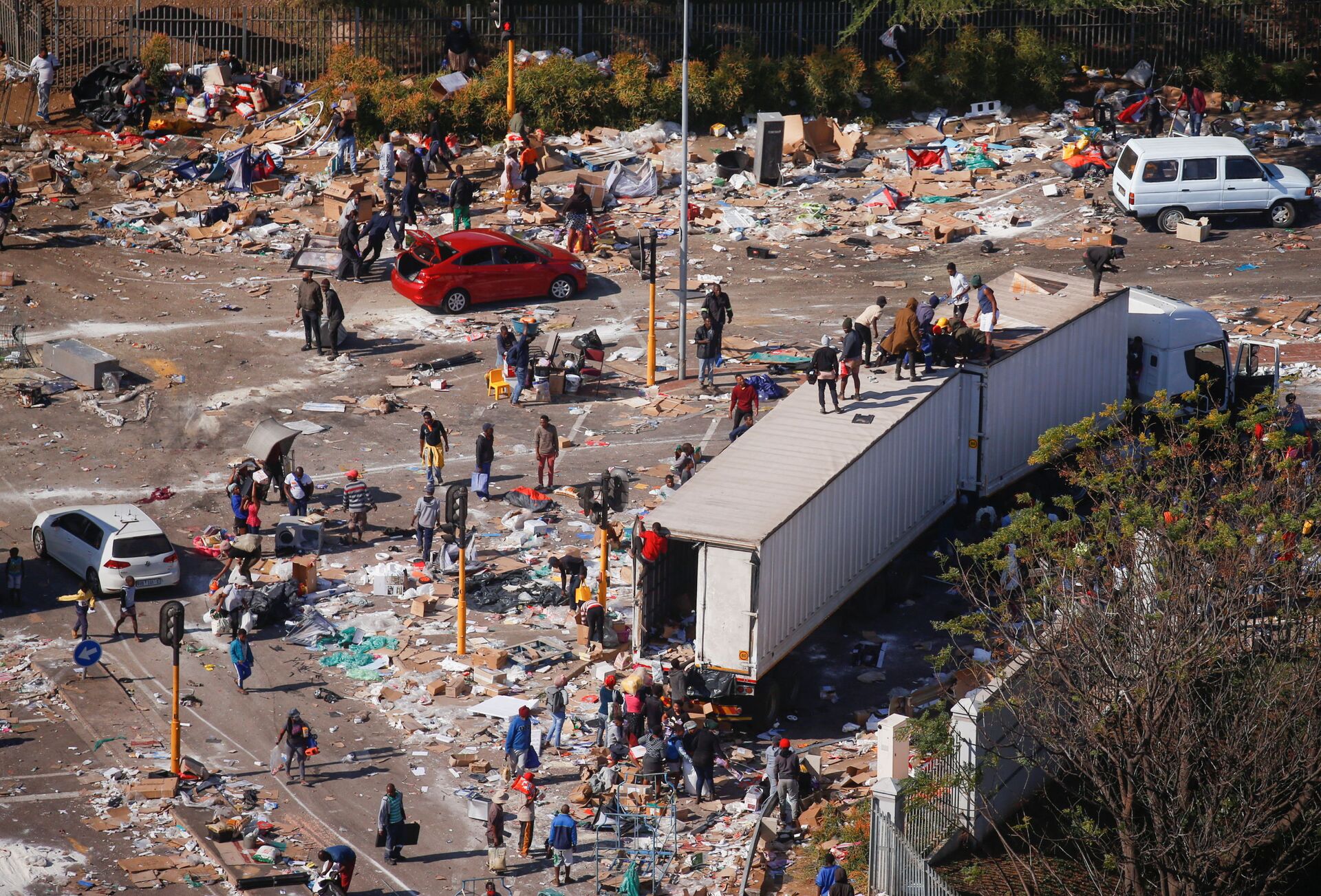
People loot an area near a burning warehouse after violence erupted following the jailing of former South African President Jacob Zuma, in Durban, South Africa, July 14, 2021.
© REUTERS / ROGAN WARD
South African commentator and Africa Brand Summit Convener Solly Moeng echoed Zounmenou's assessment of the situation but emphasised that the unhappiness about Zuma's arrest in the beginning of the events grew into criminal activities.
"Obviously, people started looting, breaking into stores and supermarkets. And it's now more than just protesting the arrest of the former president", Moeng said. "There's a lot of criminality, there's a lot of opportunism as well. But there are also suspicions that all of these riots and looting around the country are being manipulated or organised by some faceless people who are supporters of the former president".
Moeng went on to say that there is a lot of poverty in South Africa and with the COVID-19 restrictions in 2020 and up to now, some businesses and livelihoods have been destroyed.
"People don't have income. So I think a lot of people saw this as an opportunity to go in there and steal stuff, food," he said. "But it's still not just food, they steal everything they can lay their hands on - TVs, bicycles - they take whatever they can take. The question is whether or not... they can sell the stuff and make money out of it. So there's a lot of opportunities".
Moeng compared the current unrest with the Black Lives Matters rioting in the United States last year when people were breaking into stores and stealing things.
"So, you can’t say everything that is happening is because they want to demand the release of the former president. And there's a lot of opportunities into it," he noted. "But also people are seeing an opportunity to get something for themselves. Someone was interviewed today, one of the looters, who said he doesn't care about politics but he says the politicians have stolen enough and what is being stolen by the people doesn't even match what has been stolen by the politicians, which is probably true. So there's a lot of anger. They're angry at a lot of things".
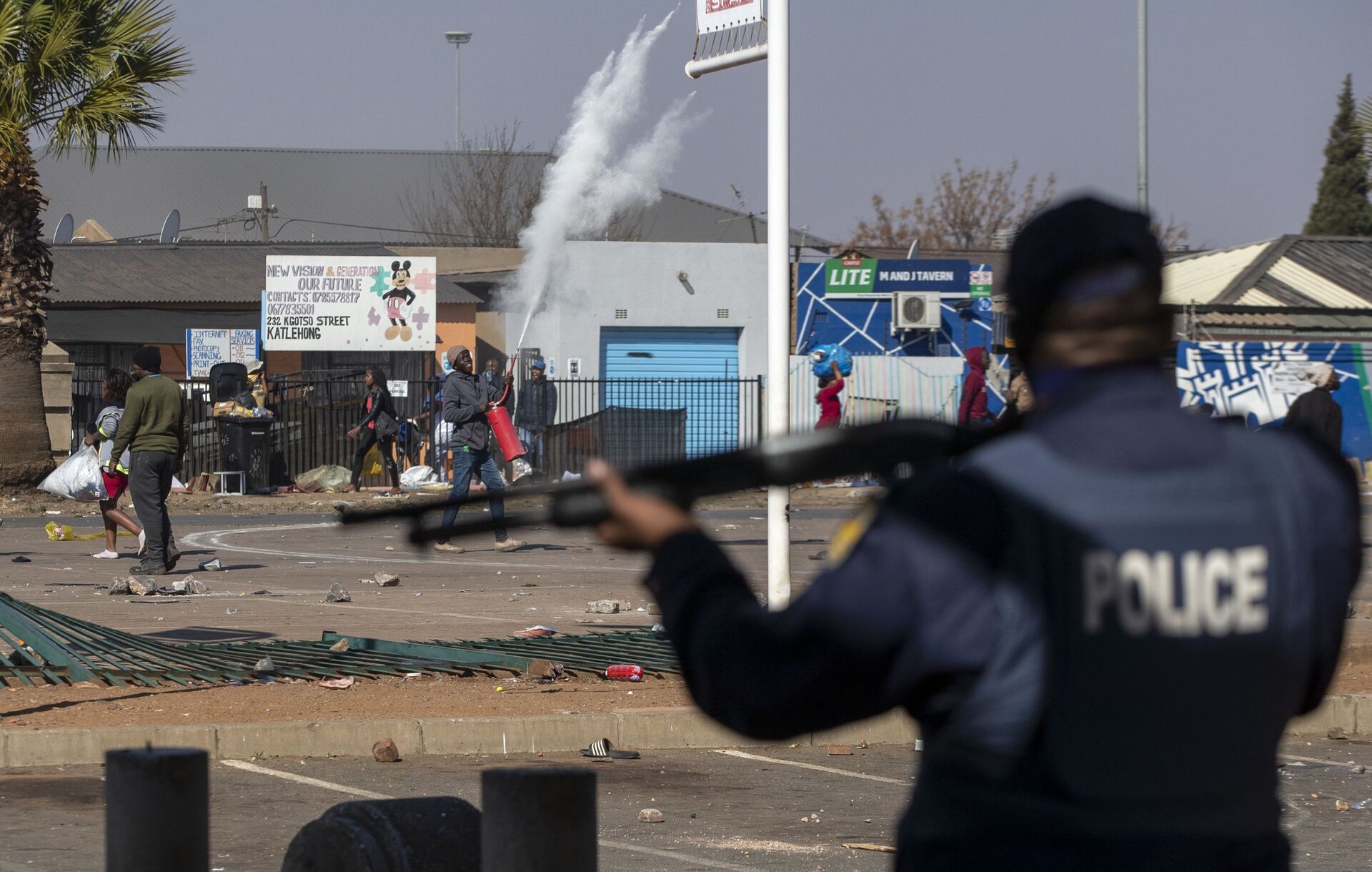
People throw stones at police as they attempt looting at Letsoho Shopping Centre in Katlehong, east of Johannesburg, South Africa, Monday, July 12, 2021.
© AP Photo / Themba Hadebe
When asked whether the protests are still ongoing, Moeng said that they are but they should not be called "protests."
"They are not protests. Maybe we shouldn’t even call them protests", he said. "These are looting sprees".
Besides, he added, during real protests, the protesters demand specific things.
"These people are not demanding anything. They just see an opportunity to go into a mall, a shop or anything that has something of value", he said.
Authorities' Response to Ongoing Unrest
Zounmenou and Moeng both criticised the authorities for failing to prevent the violence despite some previously circulated information and for not taking appropriate measures to stop it.
"South African Preventive machinery was deficient", Zounmenou said. "Rumors were circulating about plans to stage violent protests. It is observed that the state has taken time to respond. This has forced some communities to organise their own security".
Moeng also believes law enforcement is not doing enough.
"We've seen pictures and videos of police standing by, watching people looting, stealing, walking away with things," he explained. "People don't even hide their faces away from the media cameras anymore. They just do what they want… So they're not very strong in dealing with what is going on".
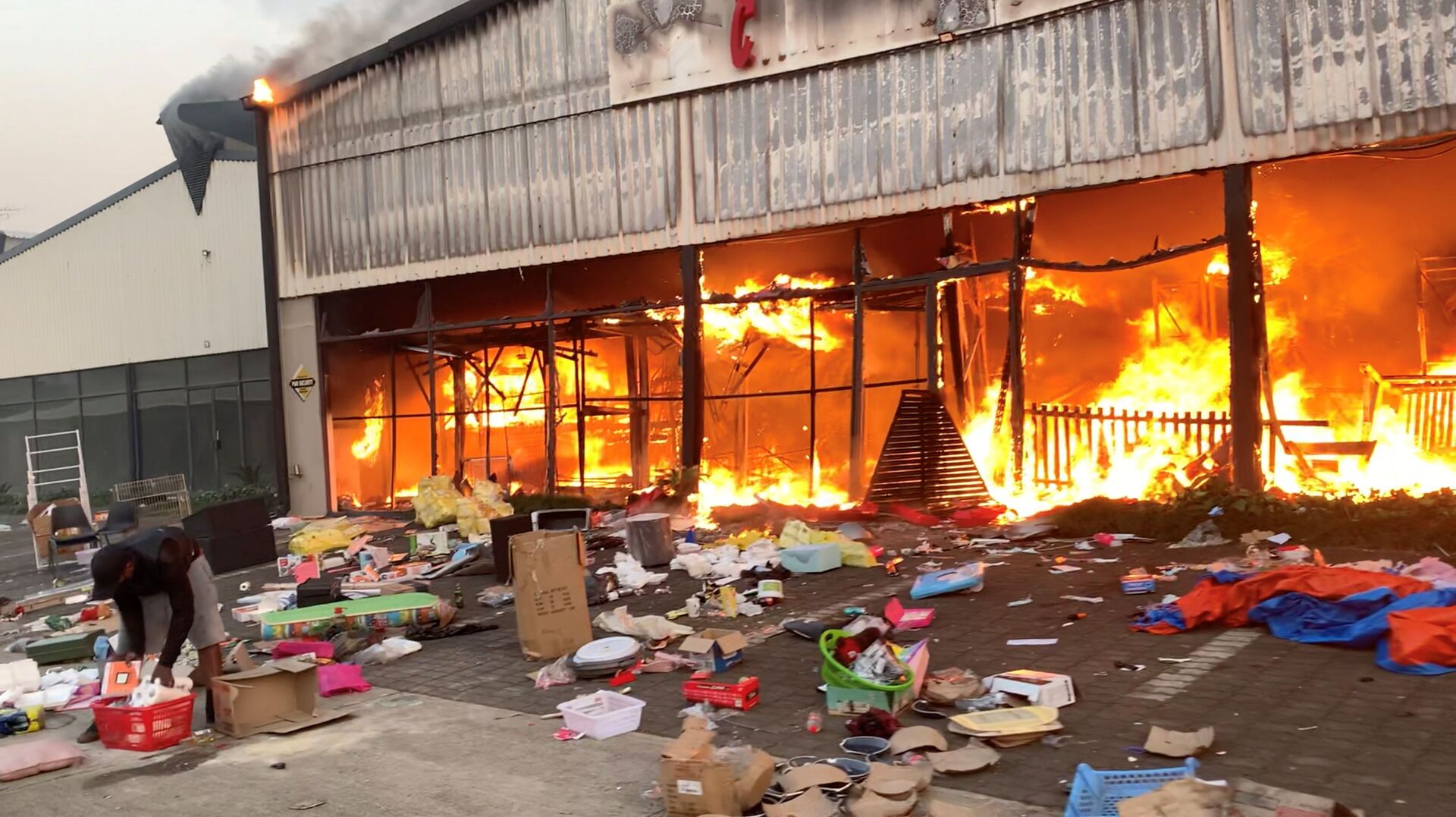
A fire engulfs Campsdrift Park, which houses Makro and China Mall, following protests that have widened into looting in Pietermaritzburg, South Africa July 13, 2021, in this screen grab taken from a video obtained from social media
© REUTERS / SIBONELO ZUNGU
Zounmenou went on to say that the government needs to immediately step up its response strategy to protect public infrastructures, people and goods.
"The deployment of the defence forces is something but security forces remain overpowered by the crowd", he said. "Local authorities also have to step in to complement government's efforts".
Moreover, the expert said, the government needs to improve conflict prevention and develop long term structural responses to deep inequalities, unemployment, and corruption and measures to absorb the impact of COVID -19 on the most vulnerable in the society.
Government Disunity
Both Zounmenou and Moeng underscore the disunity in the current government of South Africa, stressing that it adds to the ongoing violence.
"I think the problem also is that the governing African National Congress in South Africa, the ANC, is divided. So the president might say one thing, but there are people in his own party who don't agree with him," Moeng said. "There are people in his own party who think that the former president should not have been arrested and want him to be released. The governing party is not even able to speak in one voice".
Moeng stressed that such disunity represents a big issue in addressing the crisis in the country.
"There's not a united stance by government and law enforcement authorities on what needs to be done," he said. "That is a big problem".
Moeng is positive, however, that South Africa can resolve the crisis on its own and is not at a point where international assistance or any kind of interventions are needed.
"I think that South Africa must deal with this thing. I think we need sufficient political will and unity in the government. If South Africans coming together to push back against it, we can deal with it," he said. "Obviously, it started about a week ago, it's too early to start talking about international intervention. If it goes on for a month or more, then maybe we must start saying, okay, maybe we need outside help".
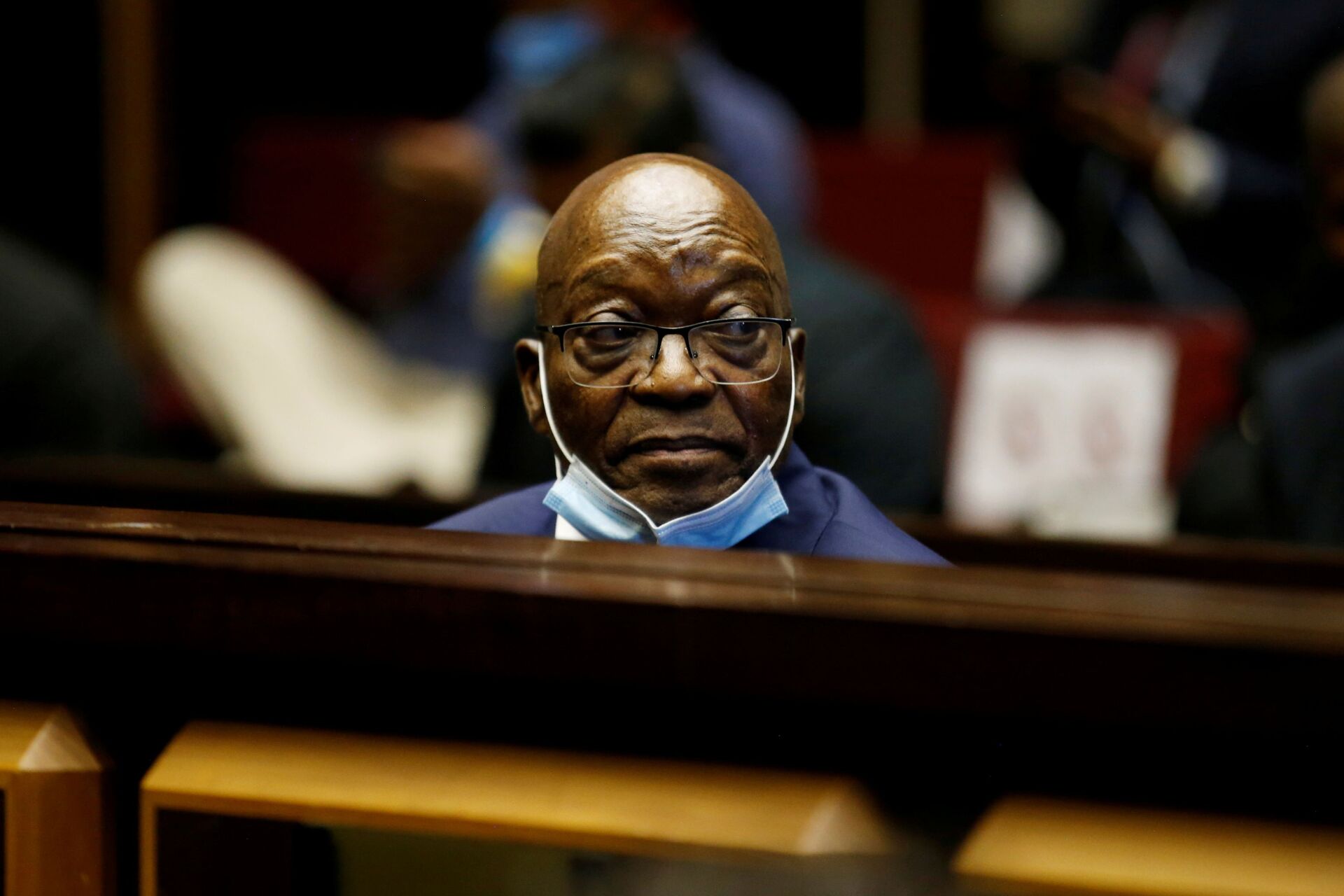
Former South African President Jacob Zuma sits in the dock after recess in his corruption trial in Pietermaritzburg, South Africa, May 26, 2021
© REUTERS / POOL
He also added that if the country gets outside aid, it matters where it gets it from.
"If it's from the West, it's going to inflame the suspicions that the president is just being manipulated or used, that he is just a pawn of the West you know and doing everything to please his Western Masters," he explained. "If there's an intervention, maybe it could come from the African Union, but not from outside Africa. It shouldn't be China. It shouldn't be the west. It shouldn't be America".
Moeng also thinks that South Africa should not borrow any money including from the IMF and World Bank.
"South Africa for many years was able to survive without borrowing money from outside," he said. "Because of corruption, and that's the biggest thing also, there's been a lot of corruption. That's why this president is in prison. We've had to borrow money from the IMF, from the World Bank, from the New Development Bank, from the BRICS Bank over the past year. Now this country is more in debt than ever. I don’t think that we need more debt… I don't think we need more money from outside, because we the people pay for that money, the politicians live large on it".
Projections for Crisis
Zounmenou believes that there is a serious threat that the violence could spread across the country from Kwa Zulu Natal, Johannesburg (Alexandra, Soweto), Mpumalanga and Limpopo among others.
"Already, food supply chains are in difficulties and petrol stations incapacitated," he said. "The most immediate risk is food shortage. Attacks on trucks delivering goods have disrupted the food supply chain. This has also cast a big shadow on the national leadership and exposed the weaknesses of the ANC".
Moeng also shared that the economic situation is already really bad, and particularly, in some provinces, people cannot go buy food or fill up their cars with petrol.
"The local economic machinery is having difficulties," he said. "If this thing is going like this, supplies are going to be hard. These people have not only attacked stores and supermarkets, they’ve also attacked some of the logistics and the centres of merchandising for the big supermarkets. So, we should just hope that the authorities and people of South Africa push back against this. If it’s going to be projected, then it's going to be really hard for people to find provisions for food, for basic necessities".
With respect to economic stability, Moeng said the country will do well if it can continue benefiting from earnings from sales of commodities which has boomed in the last six months.
"I think South Africa should have resources not to be pushed at a point where it must go and borrow more money from outside", he added.
Everything, he said, depends on how long this thing lasts and whether the government can put its foot down firmly and properly.
"If it doesn't stop, if it keeps going, it is definitely not going to be good for the economy," he explained. "Investors are going to stay away".
Moeng believes, however, that the situation in the country will not get worse.
"As the days go on, there's more army, there are more military people on the road, in the streets", he noted. "I've already seen South Africans coming together to stop the looting".
Some people, Moeng added, are getting together to protect stores in supermarkets and places like the Mall of Africa, which is surrounded by the police and military.
"The military and the police cannot be everywhere - in the malls and shopping centres, everywhere. So when there's no protection, these people just come in and do their own thing", he explained.
Moeng added that the good thing is that the South Africans have been now beginning to come together to say enough is enough, that such criminal activities shouldn't happen.
Regarding Zuma's future, he said he was worried democracy would be weakened if simply set free.
"I don't think that the government or the judiciary system should release the former president. The democracy would be in danger if they let him out. He must stay there until he can legally be released", he added. "For me, South Africa has gone through some tests, and this is another test. You know all gold must go through fire before it shines".
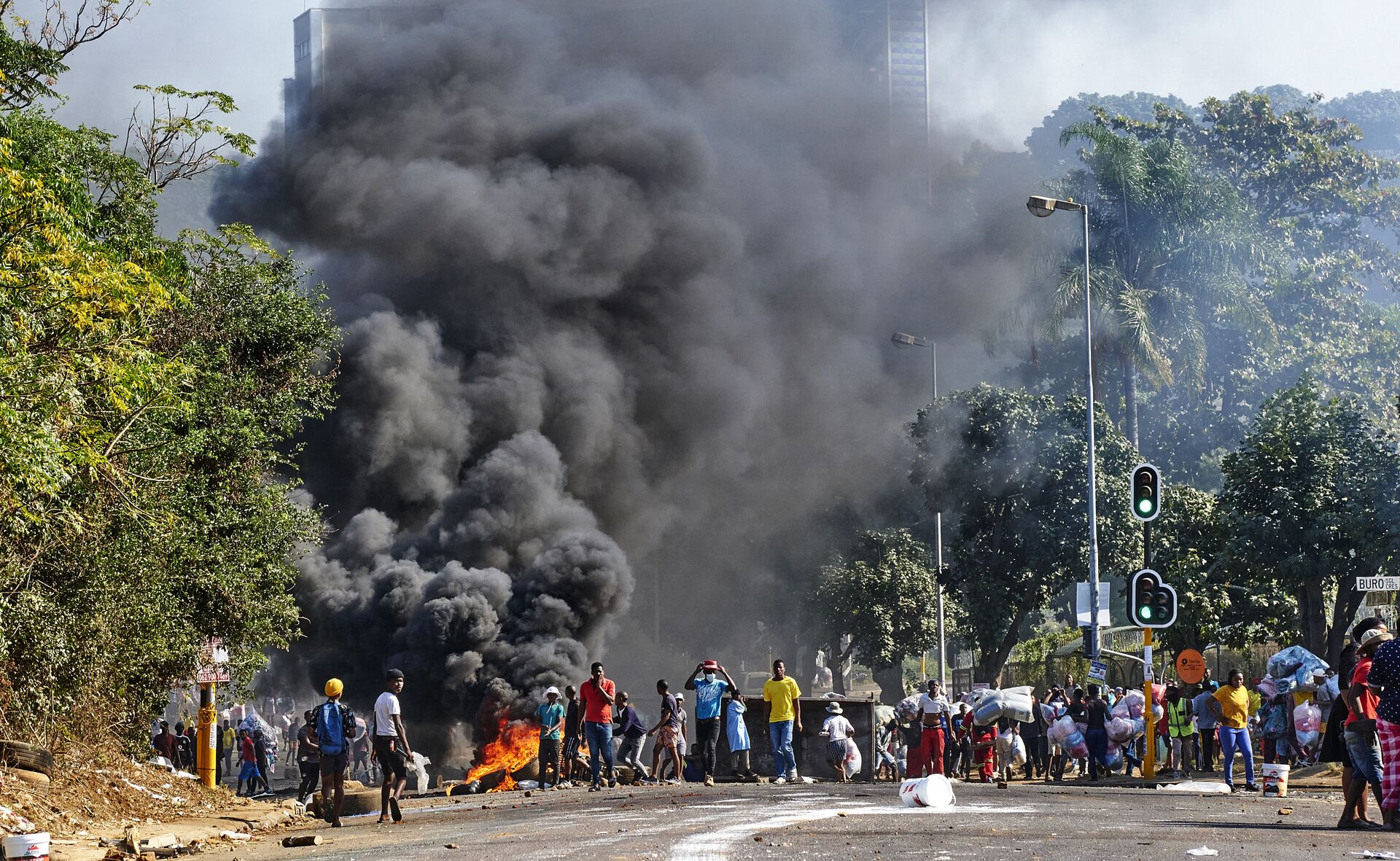
Looters outside a shopping centre alongside a burning barricade in Durban, South Africa, Monday July 12, 2021
© AP Photo / Andre Swart
After all the painful years of corruption under Zuma and his friends, he added, maybe this is what has to happen.
"I just hope that the president and the government don’t fall for the pressure to release Zuma from prison too early. Because if they do, it’s the end of this democracy. It’s important that there is a rule of law, and that’s what the South African people want. They want to know that there is equality before the law, there is no favouritism", he said.

